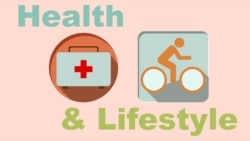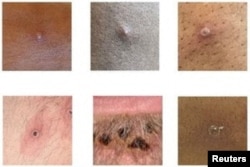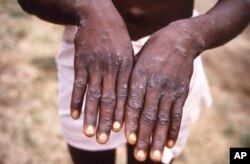The fast-spreading monkeypox virus led the World Health Organization (WHO) to declare a “public health emergency of international concern” this month.
WHO director-general Tedros Adhanom Ghebreyesus said in a statement, “the outbreak has continued to grow, and there are now more than 16 thousand reported cases from 75 countries and territories, and five deaths.”
He added: “We have an outbreak that has spread… through new modes of transmission, about which we understand too little.”
In recent years, the health agency has issued such declarations on COVID-19, Ebola, and the Zika viruses.
How dangerous is monkeypox?
The United States Centers for Disease Control and Prevention (CDC) says that monkeypox is part of the same virus family as smallpox.
Monkeypox was first discovered in 1958 among groups of monkeys used for research. The first human case of monkeypox was recorded in 1970. The virus spreads mainly through close contact with an infected person.
Until this year, the viral disease has rarely spread outside Africa. But reports of new cases in Europe and other places signaled that the outbreak had spread around the world.
Monkeypox symptoms are similar to smallpox but milder. Most patients only experience fever, aches, and tiredness. Some may develop a rash with cuts on their face and hands that can spread to other parts of the body. The sickness usually lasts two to four weeks.
The virus can spread from person to person through direct contact with the infectious rash, sex with an infected person or contact with their clothes or bedding. A pregnant woman can also pass the virus to her fetus.
Unlike the SARS-CoV-2 virus that caused the COVID-19 pandemic, monkeypox does not spread easily over the air.
Anyone can spread the virus, but the current outbreak outside of Africa appeared to spread mainly among men who have sex with men.
Why is it an emergency?
Health officials from several countries urged the WHO to declare monkeypox a public health emergency as the disease spread quickly in the past month.
From June to July, the WHO reported that cases of monkeypox had increased from 3,040 to more than 16,000. The number of countries with infections have also gone up from 47 to 75.
Officials were especially concerned that the disease has spread quickly among people who did not travel to Africa where the disease is endemic. That means it has become permanently established in an area.
The emergency declaration usually brings more resources and action to deal with the outbreak. It also pushes countries to work together on testing and producing vaccines and treatments for the disease.
For now, the WHO said the risk of monkeypox is “moderate” around the world, except in Europe where it listed the risk as “high.”
How to protect yourself
CDC health officials advise that people should avoid close, skin-to-skin contact with people who have a rash that looks like monkeypox. They say:
- Do not touch, hug, kiss or have sex with someone with monkeypox.
- Do not share utensils for eating or drinking
- Do not touch bedding or clothing of an infected person.
- And wash hands often with soap and water or use hand sanitizer.
In Central and West Africa, the CDC says people should avoid contact with animals that can spread the monkeypox virus, such as monkeys and rodents. And they should also avoid sick or dead animals.
At this time, health officials are still learning whether children and people with existing health problems are more at risk of the disease.
Treatment
If you are sick with monkeypox, health officials say you should remain isolated.
There is no cure for monkeypox. However, the CDC says monkeypox and smallpox viruses are genetically similar, which means that antiviral drugs and vaccines developed to protect against smallpox may be used to prevent and treat monkeypox virus infections.
U.S. and European health officials say antivirals, such as tecovirimat, may be given to people who are more likely to get severely sick. That group includes patients with weakened immune systems.
Health officials in Europe and the U.S. have also recently announced that they will send out monkeypox vaccines to affected communities. The two-shot vaccine is being manufactured at Bavarian Nordic’s plant in Denmark.
I’m Caty Weaver.
Hai Do wrote this report for VOA Learning English with information from the WHO and the CDC.
_______________________________________________________________________
Words in This Story
mode –n. a particular way something is done
transmission - n. the process by which something is spread
fever –n. a body temperature that is higher than normal
ache - n. a pain that is not sharp but continues for a long time
rash –n. red spots on the skin that are caused by an infection or a reaction to some substance
utensil - n. device used at home or kitchen
sanitizer - n. things used to make something free from infection, disease
isolated - adj. separated from others
_______________________________________________________________________
Have you heard of monkeypox? We want to hear from you.
We have a new comment system. Here is how it works:
Write your comment in the box.
Under the box, you can see four images for social media accounts. They are for Disqus, Facebook, Twitter and Google.
Click on one image and a box appears. Enter the login for your social media account. Or you may create one on the Disqus system. It is the blue circle with “D” on it. It is free.
Each time you return to comment on the Learning English site, you can use your account and see your comments and replies to them. Our comment policy is here.











Forum